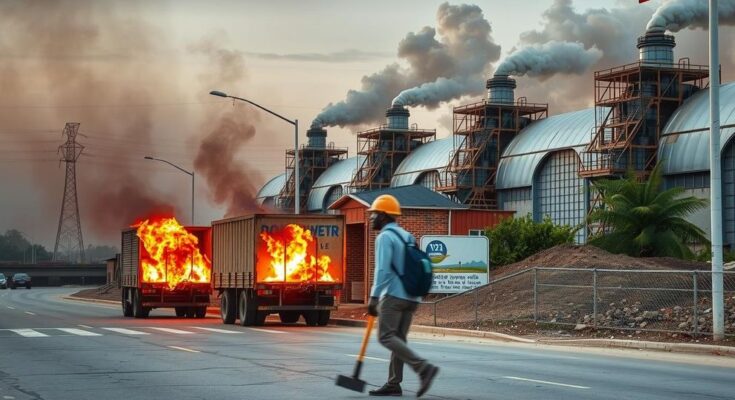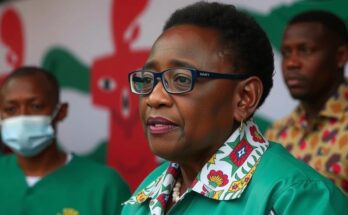Post-election protests in Mozambique have led to the shutdown of two power plants after demonstrators demanded an end to energy production in response to alleged electoral fraud by the ruling Frelimo party. The protests follow the controversial results of the October 9 elections and have resulted in significant disruptions, with at least 90 fatalities reported amid escalating violence. Opposition leader Venancio Mondlane continues to contest the election results, claiming he received a greater share of the votes than officially declared.
Post-election protests in Mozambique have led to the paralysis of two significant power plants, namely the Ressano Garcia and Gigawatt thermoelectric plants, as reported by the national utility, Electricidade de Moçambique. Following the declaration of the ruling Frelimo party as the winner of the disputed October 9 elections, opposition parties denounced the results as fraudulent. In response, demonstrators gathered at the plants demanding a complete halt to energy production due to the escalating unrest across the nation.
Fearing potential repercussions, Electricidade de Moçambique stated that the plants, located near the South African border, had been compelled to cease operations, resulting in a notable supply shortfall—approximately 30 percent below the demand in the southern region, which is home to around six million residents. Additionally, traffic disruptions in the vicinity of these power stations were reported, further exacerbating the situation.
The unrest has been fueled by comments from opposition leader Venancio Mondlane, who asserted on social media that there was a second attempt on his life following a previous incident. Mondlane, who finished second in the election behind Frelimo’s Daniel Chapo, remains in hiding in South Africa after contesting the electoral results. The election commission claimed Chapo garnered nearly 71 percent of the vote, while Mondlane counters that he received 53 percent and claims Chapo only received 36 percent.
International observers have noted various irregularities throughout the electoral process, and since October 21, at least 90 individuals have lost their lives amidst violence between security forces and protesters opposing the government.
The protests in Mozambique stem from the October 9 elections, where the ruling Frelimo party was declared the victor amid allegations of electoral fraud by the opposition. The situation escalated as opposition candidate Venancio Mondlane accused authorities of falsely representing the election results, leading to widespread public outrage and unrest. The political climate has been further destabilized by claims of attempts on Mondlane’s life, exacerbating tensions between the government and its critics. These events highlight the deep-seated political divisions in Mozambique and reflect broader issues regarding governance, representation, and civil liberties, drawing attention from international observers monitoring the elections. The country has faced significant violence in the wake of the elections, raising concerns about the security situation and the potential for further unrest.
In conclusion, the post-election turmoil in Mozambique has resulted in significant disruptions, including the halting of operations at crucial power plants, which has left a substantial portion of the population at risk of power shortages. The unfolding situation is indicative of deep political divisions and dissatisfaction among the populace, particularly concerning the conduct of the electoral process and the actions of the governing party. Continuous monitoring and dialogue will be essential to address the grievances of the citizens and restore stability in the region.
Original Source: www.barrons.com




